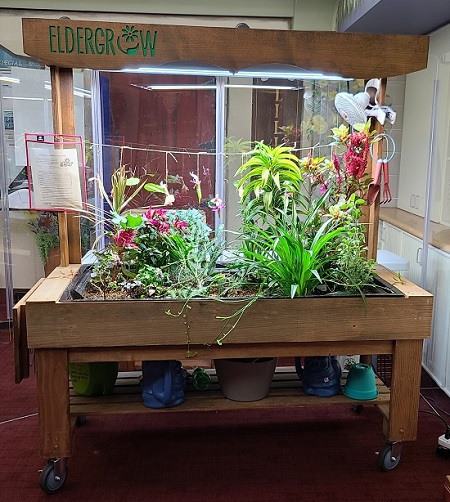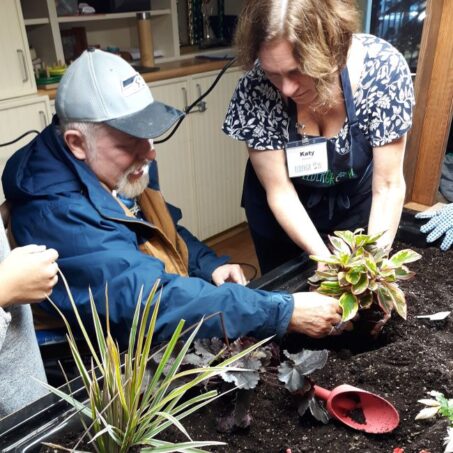Evidence-Based Therapeutic Horticulture Program Improves Lives of Residents
LeadingAge Washington regularly applies for Civil Money Penalty (CMP) grants to help its member skilled nursing providers implement creative resident engagement programs. These grants have included a “Cycling Without Age” program, initiatives using the PARO Robotic Therapy Seal for residents living with dementia, engagement technology in partnership with iN2L, and more. Pat Sylvia, director of education and member development for LeadingAge Washington, says more than $3.5 million worth of CMP grants have gone to skilled nursing providers in Washington state.
One of the most popular programs is a partnership with Eldergrow, a therapeutic horticulture company founded by Orla Concannon, whose background in gerontology and aging services management convinced her of the value of the healing properties of nature.
The therapeutic horticulture program brings gardening indoors for residents in skilled nursing communities across the country. Eldergrow provides a self-contained indoor garden full of colorful, fragrant, and nontoxic plants and herbs. These gardens are on wheels and are hand-crafted by veterans and adults living with disabilities. The gardens have their own lighting and ventilation systems. As part of the grant, Eldergrow staff will install the garden and then visit twice a month to give therapeutic horticulture lessons to residents and staff.
According to LeadingAge Washington, the program has served more than 3,200 Washington state residents, with about 97% of participants showing “a positive demeanor or improvement of mood over the course of the lessons.”
“We have a lot of residents here that love to garden, and we didn’t have the resources to allow them to fully utilize their gardening skills,” says Delores Wallaker, activity director at LeadingAge member Garden Village, Yakima, WA. “Eldergrow was so engaging for our residents. It made them feel very welcome and want to participate, and it was probably one of our largest group activities.”
Garden Village is a unique provider that serves “the most complex nursing home residents in the state.” It was honored as the LeadingAge Catalyst for Sept. 2019.
During the visitation restrictions required by COVID-19, Eldergrow staff couldn’t come into the buildings. At Garden Village, staff simply pushed the garden outside, where Eldergrow would perform needed maintenance and add new plants. Packets of information were emailed to activities staff to allow them to work one-on-one with residents.
Another LeadingAge member, McKay Healthcare and Rehabilitation, Soap Lake, WA, had its garden installed in early 2020, right before the pandemic took off. Like Garden Village, McKay got its grant via LeadingAge Washington, and was the first provider in rural Grant County to join the Eldergrow program. Administrator Erica Gaertner says the Eldergrow staff was able to make one in-person visit before the pandemic.
According to Gaertner, McKay staff move the garden weekly, and now an Eldergrow educator comes in at least twice a month to give classes. During visitor restrictions, Eldergrow simply shipped materials every month.
McKay Activities Director Niki Frazier says staff sets aside a “garden time” for residents. One resident manages the daily watering, recording it each time.
“We have a few people who haven’t touched soil in a long time,” Frazier says. “Now, pretty much daily it’s touched.” She says that weekly classes usually attract about 15 residents at a time. One-on-one sessions are held in a sensory room in the building and add the sounds of streams and campfires, which residents enjoy.
Resident Benefits
Garden Village staff say the benefits to residents are very noticeable.
“It’s helped quite a bit,” says Wallaker. “We specialize in behavioral health, so we want to look for opportunities to not utilize psychotropic medications. We had one resident in particular who would constantly call out for help. Even though her needs were met, she would still continue to call out even if staff were sitting with her. Once we started taking her to the garden, she would sit and have a full conversation about the plants. It just brought her anxiety level down.”

Residents enjoy puttering in the garden and help to maintain the plants. Group gardening sessions were eliminated during the pandemic, replaced with one-at-a-time visits. One Garden Village resident got in the habit of uprooting plants, thinking that she was “pulling weeds.” Staff found some weedy-looking plastic plants at a dollar store and put them in the box to direct the resident’s attention.
Wallaker says that more than 30 of Garden Village’s 74 residents have participated in the program. “It really helps even the residents that aren’t able to verbalize or communicate well,” she says. “We take them to the garden, which has herbs and mints, and we get really good responses.”
Eldergrow’s Concannon believes one of the most important benefits of therapeutic horticulture for older adults in skilled nursing is the sense of renewed purpose and accomplishment that comes with nurturing a garden.
“One of the key principles around the Montessori approach [to dementia care] is productivity, and letting residents do certain tasks,” Concannon says. “With the Eldergrow garden, whether it’s watering, tilling the soil, or partaking in a session with us, we interact with a lot of the residents. I once worked in senior living, in memory care settings, and I saw the opportunity to give residents and staff ways to meaningfully engage one another in an authentic way. The garden has fragrant herbs in it, and you can do sensory stimulation with the residents which can reduce anxiety, help them to reminisce, and give them a sense of place in doing so.”
She refers to research showing that daily gardening can reduce the risk factors for dementia by 36%. “That statistic, right there, was what really compelled me to pursue therapeutic horticulture.” She refers to a statement by one of her first clients, who said that she was used to “spending her time thinking of the past, but gardening gives her something to look forward to.” The Eldergrow website includes numerous links to research on the benefits of nature therapy for older adults.
The Washington state indoor gardens project was highlighted in a recent CMP Project Spotlight document published by CMS.

Most Recommended
October 15, 2025
 Shutdown Week Three: Impact of Ongoing Closure on Affordable Housing
Shutdown Week Three: Impact of Ongoing Closure on Affordable Housing
February 24, 2026
Fiscal Year (FY) Funding 2026
October 07, 2025
Immigrant Workforce Matching Program Brings Workforce Relief
Recently Added
February 26, 2026
HUD Interim Rule Revokes Eviction Notification Requirements
February 26, 2026
President Trump's SOTU: Key Takeaways
February 26, 2026



